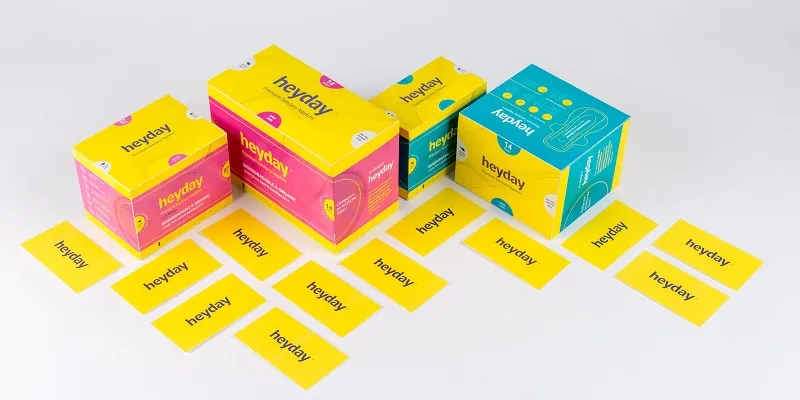Eco-friendly brand Heyday hopes to revolutionise the sanitary napkin segment
Deepanjali Dalmia has launched a sanitary pad brand, made from bio fibre, that will be a healthier and safer alternative to the existing options.
Delhi-based entrepreneur Deepanjali Dalmia launched sanitary napkin brand Heyday last month. A Columbia University graduate, Deepanjali realised her business idea would fill the huge gap that exists in the menstrual hygiene segment. The product has been evolved after research spanning over two years and the final product is an improvement of several previous iterations.

Made from bamboo and corn fibre, Heyday pads are highly absorbent while being priced affordably and the founder claims they are a healthy and planet-friendly alternative to plastic pads.
Deepanjali says,
I strongly believe that we have two homes — our bodies and the environment — and we must take care of both.
Currently available in stores and pharmacies in the Delhi NCR, Gurugram, and Noida regions, the product will be available online in a couple of weeks, thereby becoming accessible to consumers across the country.
The problems the product is trying to solve
Indian women choose sanitary pads based on comfort and pricing, rarely realising the health hazards hidden in this essential product. Most commercially available napkins have a highly absorbent core that is drenched in chlorine bleach and other chemicals. Apart from causing discomfort, yeast infections, skin rashes and UTI, long-term usage can result in pelvic inflammatory disease, cervical cancer, and impaired fertility. In the Indian market, most brands do not identify the pH range, and there have been cases of products rejected by government regulations in the US or Europe being sold here.
There is also the environmental factor to consider. Only 12 percent of the 355 million women of menstruating age in India can afford disposable sanitary napkins. However, these 42.6 million Indian women will throw away over 21 billion sanitary napkins into a landfill in their lives.
Since commercial pads are made up of over 90 percent plastic with super-absorbent polymers and non-woven plastic components, they are not biodegradable. Even incineration is problematic since the chemicals can release toxic gases upon burning. Sanitary waste that clogs up landfills becomes a breeding ground of bacteria such as Escherichia coli.
The entrepreneur’s story
An alumna of Delhi’s Carmel Convent School and Barnard College of Columbia University, New York, 25-year-old Deepanjali credits her education for the way she approaches business. “A small yet ambitious group of women thriving with an Ivy-League education in a place like Manhattan was an enriching experience that fuelled my passion to make a difference,” she says.
Deepanjali also worked for a Big-Four firm, Ernst and Young, as a financial consultant in New York for a year. Needless to say, she cut her teeth for business there. With Heyday, Deepanjali believes she has hit upon the perfect combination — a scalable business that will have a social impact.

Heyday is manufactured at international facilities in China and Finland where the napkins are produced in 12 production lines using highly specialised technology to ensure the ingredients are authentically organic and biodegradable.
The technology that is required to produce a napkin and napkin cover made from natural plant-based fibres has taken years to develop. Creating the product prototype required intensive testing to establish the right combination of bamboo fibre for high absorbing capacity and antibacterial properties along with corn starch for the softness of the pads.
Deepanjali says,
We wanted to use organic raw materials to ensure that chemicals and pesticides that cause infections and diseases could be kept away from contact with the skin. For this we found areas where bamboo and corn had been grown organically, keeping the soil chemical-free for over a decade. A lot of thought and care has gone into producing a superior-quality and safe finished product.
The other players
Most of the natural sanitary pad units are located in small towns and are aimed at rural women. Saathi pads, Soukhyam in Kerala, Sakhi pads in Vadodara, and Aakar Foundation’s Anandi pads are a few such eco-friendly, low-cost, biodegradable sanitary napkin brands. Among quality brands aimed at urban women, there is Nisha Bains’ Purganics and international brands like Organyc and Natracare. For Heyday, the differentiator right now is the pricing, which is lower than is usual for the organic segment. Deepanjali has kept the costs highly competitive, in the range of Rs 79 to Rs 165 for packs of seven and 14 respectively, since Heyday is a new entrant. Her aim right now is to get the customer base familiarised with the product.







